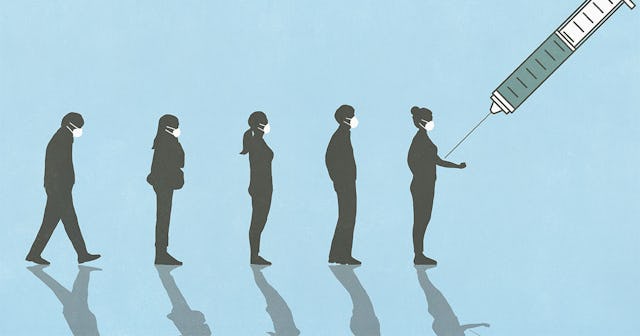Some Anti-Vaxxers Are Lying About Having Adverse Reactions To The COVID Vaccine

I’m not generally a distrustful person, but more and more lately, I’m finding myself absolutely baffled by the lengths anti-vaxxers are willing to go in order to scare people away from vaccines.
Case in point: I recently shared an article about what we’ve learned so far about allergic reactions to the COVID-19 vaccine. In doing so, I invited those reading the post to share what their experiences with the vaccine had been, for those who had received their first dose already.
The vast majority of people responding wrote that they’d experienced nothing more than a sore arm (similar to getting a flu shot) and were excited for their second dose. One or two mentioned having minor allergic reactions that were quickly treated. And another small handful said they had experienced flu-like symptoms after their injection, which can be typical of any vaccine producing an immune response.
But one commenter wrote of a reaction so severe it definitely called for concern:
“I had 1 dose I was in the hospital for two weeks with anaphylactic shock,” she wrote. “About half hour or more after the initial shot I felt like my airway was closing up and collapsed on the floor and passed out. The next thing I was in the emergency room with IVs And had some test done which resulted in an allergic reaction. Finally things started getting better after three or four days but they wanted to keep me two weeks to observe. I would never get the shot it was like death was knocking at the door I just wanna put it out there and caution people about this disease.”
I like to think of myself as a pretty empathetic person, and I would never want to call someone out who has gone through a truly traumatic medical event. So my initial response was to show empathy for this commenter and tell them I was sorry they had been through something so awful. But my Spidey senses were tingling.
First of all, I know enough about allergic reactions to know it would be rare for someone to be hospitalized for 2 weeks following an anaphylactic reaction—especially if they showed improvement after just a few days.
It’s not unheard of, but is unlikely.
Second of all, this post was made on January 14th. If this person had been in the hospital for 2 weeks and was already out and able to tell their story, they would have been among the very first round of people receiving the vaccine—an opportunity reserved at the time for hospital workers, people in assisted living facilities, and politicians cutting the line.
A quick scan through this person’s public Facebook postings told me they likely didn’t fall into any of those categories. In fact, most of their posts were anti-science, pro-conspiracy rhetoric that made it clear they probably wouldn’t have been jumping to get the vaccine even if they were given the opportunity.
Finally, the VAERS reporting data had exactly zero reports of such a long-term hospital stay post COVID-19 vaccination. And in fact, only 21 cases of anaphylaxis total were reported in response to the first nearly 2 million vaccinations given (a rate of .0011 percent of those receiving vaccine, compared to the 1.7 percent of COVID cases resulting in death reported at the same time.)
Because my page is public, and because several thousand people had already seen this particular post, I felt like I had no choice but to publicly call this person out and share what I’d learned when researching their claim.
It’s irresponsible to leave misinformation like that unchecked, and also—I wanted to give this person a chance to explain themselves, if they had any explanation at all.
Unfortunately, they quickly deleted their post once confronted with their lies. It was to be expected (and is why I took screenshots to begin with), but still disappointing. Especially because I had pointed out that their public posts were part of what set off my suspicions. Now there’s nothing I can do to prevent them from deleting or hiding those public posts prior to continuing to spread their lie, slightly less easy to detect.
I honestly don’t understand people like this. If you have sincere concerns about vaccines, you should be able to discuss those concerns using facts and data—not egregious lies and manipulation. If you’ve got to lie about something to prove your point, how much of a point do you really have to begin with?
But I’m more concerned about the people who may see posts like this and believe them at face value. The people who don’t fully understand how to look up that data themselves (it can definitely be complicated) and don’t realize how malicious some anti-vaxxers truly are.
VICTOR HABBICK VISIONS/SCIENCE PHOTO LIBRARY/Getty
These are lies being spread at the potential cost of human lives, and nothing about that is okay.
So when you see someone you don’t know sharing about a particularly severe reaction they claim to have had to the COVID-19 vaccine (or any vaccine, for that matter) exercise caution in how readily you believe them. These types of reactions are extremely rare, and statistically, far more lives are saved by vaccines than people who experience reactions to them.
Remember: anyone can say anything online. It’s on us to consider the source and do our own research.
We may not be able to stop anti-vaxxers from spreading their lies, but we can control the impact we allow those lies to have on our own decision-making skills.
This article was originally published on